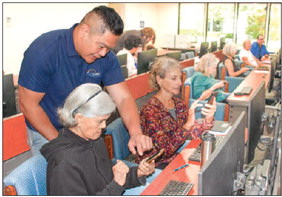Protect your most important asset


YOUR HEART, YOUR HEALTH
How to care for our aging hearts
Editor’s Note: Heart disease is a leading cause of death in the U.S., claiming the lives of more than 650,000 people each year. February is American Heart Month, a time when LW residents can focus on their cardiovascular health. In this and the next issue, there will be stories and columns highlighting steps everyone can take to protect themselves and have a better understanding of heart disease risk factors, such as high blood pressure, bad cholesterol, smoking, being overweight or obese, and type 2 diabetes.
by Omid Vahdat, M.D.
cardiologist MemorialCare Long Beach Medical Center
February is National Heart Month, and while we celebrate this during the shortest month of the year, it’s important to keep your heart health at the top of your mind year-round.
You may think, and some of my very own patients have told me, “Dr. Vahdat, I’m already this old; what can I do now?”
And I’ll tell you what I tell all my patients: Whether you have an existing heart condition or have never had one at all, it’s never too late to start taking care of your heart.
According to the Centers for Disease Control, 21.7 percent of adults aged 65 or older are diagnosed with coronary heart disease (CHD). Also, as we age, we are just more prone to highblood pressure and obesity, which can lead to heart disease.
Let’s face it: We put our bodies through so much over the course of our lives, and change does happen.
For example, as you age your heart can’t beat as fast during physical activity or times of stress as it once did. Also, during the aging process, hearts can grow enlarged and the veins in the heart can stiffen, making it harder for blood to pass through.
So, what can you do? Here are some tips to keep your aging heart healthy:
• Get more physically active daily. You live in a beautiful community, and the weather is going to warm up, so get out and enjoy it.
You don’t need to go far, but a single 30-minute walk at a pace that is comfortable to you gets the blood pumping and keeps the heart thumping.
If you have mobility issues, then try to at least get some movement. There are seated and chair exercises that could be beneficial; just talk to your physician first.
• If you smoke, please quit. Smoking is one of the worst things you can do to your heart.
I’m a cardiologist, but speaking to overall health, nothing good comes from smoking, from cancer to damage to your teeth, it’s just not good. I know it’s hard to quit, but there are options out there to help from smoking cessation courses to patches and gum.
• Eat healthier. I get it; you’ve eaten “this way” your whole life.
I’m not asking you to completely change your lifestyle. Just change portion sizes and maybe try to add a little more fruits and veggies on your plate than you usually do.
And stay away from fried food. If you want to indulge, go for it, but try to not make that a regular habit.
• Maintainahealthyweight. If you take some of the actions I mentioned above, this will come naturally. But if you find your pants getting a little tighter, it may be time to look at your daily habits.
• Reduce stress. The stress hormone cortisol is nobody’s friend.
It increases glucose in the body and brain, which can raise blood pressure and cause you to hold onto weight. In addition, ongoing stress can put added strain on the heart. Try to find calming activities and hobbies that relax you to help keep your stress levels down. I hope this heart month you commit to care for your heart year-round, so you can continue to enjoy your life and all it has to offer. It’s always important to consult your primary care physician and discuss your heart health during every physical. Should you need more specialized heart care, Memorial-Care has multiple locations, and the specialized MemorialCare Heart and Vascular Institute at Long Beach Medical Center available to you.
About Dr. Vahdat:
Omid Vahdat, M.D., is a board-certified cardiologist in private practice in Los Alamitos with privileges at the MemorialCare Heart and Vascular Institute at Long Beach Medical Center. He specializes in interventional cardiology for ischemic and valve heart disease, including congenital heart abnormalities.




